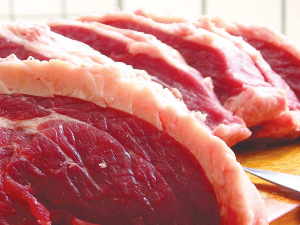NZ scientists make breakthrough in Facial Eczema research
A significant breakthrough in understanding facial eczema (FE) in livestock brings New Zealand closer to reducing the disease’s devastating impact on farmers, animals, and rural communities.
 Research has shown that red meat delivers more of the essential protein building blocks for humans compared to plant-based alternatives.
Research has shown that red meat delivers more of the essential protein building blocks for humans compared to plant-based alternatives.
Meat delivers more of the essential protein building blocks compared to a plant-based alternative.
That’s the findings from a human clinical trial done for the Pasture Raised Advantage research programme to explore the health and wellbeing benefits of eating pasture-raised beef and lamb as part of a balanced diet, compared to grain-finished beef or a plant-based alternative.
The project, which involved researchers at AgResearch, the University of Auckland, Massey University and the Riddet Institute, shows that red meat is probably a better source of protein for the body than highly processed plant-based products promoted as meat alternatives.
In this first of two clinical trials, 30 participants aged 20-34 years were fed breakfast on four different days and their blood, digestive symptoms and mood were monitored for four hours immediately following the meal.
Breakfast was a burrito that contained a single serving of a different protein each day; pasture-raised beef, grainfinished beef, lamb and a plant-based alternative – served in random order to each participant across the four days.
University of Auckland’s Andrea Braakhuis, who heads up the team of nutrition scientists responsible for the study, says they measured the nutrients in the blood of the participants.
It saw a significant difference in the type and amounts of amino acids that come from the digestion of the protein of red meat compared to the protein of the processed meat alternative.
“Amino acids from red meat were of greater biological value and better absorbed by the body,” she says.
AgResearch senior scientist Scott Knowles says the new generation of plant-based meat analogues are formulated to mimic the taste and basic nutrient composition of meat. But he says very little is known yet about their nutritional quality and health benefits.
“Plant-based alternatives are produced very differently from pasture- raised livestock and they’re marketed as having advantages in environmental footprint and sustainability,” Knowles explains. “Those credentials are still being scrutinised. However, we know for certain that NZ farmers are producing a highly nutritious food in one of the most efficient production systems in the world.”
A New Zealand dairy industry leader believes the free trade deal announced with India delivers wins for the sector.
The Coalition Government will need the support of at least one opposition party to ratify the free trade deal with India.
Primary sector leaders have welcomed the announcement of a Free Trade Agreement between India and New Zealand.
At Pāmu’s Kepler Farm in Manapouri, mating has wrapped up at the across-breed Beef Progeny Test.
More than 150 people turned up at Parliament recently to celebrate the 20th anniversary of Horticulture New Zealand (HortNZ).
Biosecurity New Zealand says Kiwis should continue to keep an eye out for yellow-legged hornets (Vespa velutina) over the holiday season.

OPINION: The release of the Natural Environment Bill and Planning Bill to replace the Resource Management Act is a red-letter day…
OPINION: Federated Farmers has launched a new campaign, swapping ‘The Twelve Days of Christmas’ for ‘The Twelve Pests of Christmas’ to…